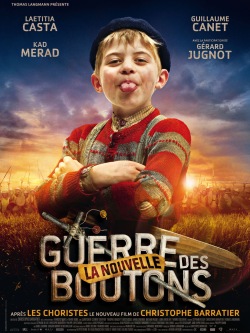La Nouvelle guerre des boutons

Man, Hollywood is really out of new ideas, right? Who else would come up with a smarmy, pandering adaptation of a 1912 novel that’s already had one foreign adaptation and two domestic ones, one of which was released literally a week before this one? Well, for one, the French makers of La Nouvelle guerre des boutons — subtitled in English simple as War of the Buttons because for American audiences it doesn’t need to be distinguished from the other film of the exact same title being released this year. Remember, people: just because it’s French doesn’t mean it’s not awful.
So, in case you haven’t ever heard of this story before — and seriously, rent the Irish version if you haven’t — two groups of boys from neighboring towns fall into an escalating conflict starting with a dispute over who is allowed to use which field for trapping. Then they take to cutting buttons off of each other’s clothes, leaving the vanquished to waddle home, holding their pants up in humiliation. And it escalates from there, teaching a valuable lesson about the futility of violent conflict.
But this time we’re going to take the whole thing and drop it into the middle of occupied France in 1944, which makes it about the resistance and Nazi racism and other things that play well with undiscerning audiences because they provide easy right and wrong answers painted in primary colors, with obvious heroes and villains.
Lebrac (Jean Texier) is the leader of the kids from Longeverne against those from neighboring Velrans, led by “l’Aztec” (Thomas Goldberg). Lebrac isn’t the brightest guy in class, and he’s learned a rather hard-knock approach to life from his emotionally-distant father (Kad Merad).
But the focus is completely shifted to the new girl, Violette (Ilona Bachelier), claimed as the goddaughter of Simone (Laetitia Casta), who returns to town from Paris to take care of the girl away from the city until things die down. Of course, this throws her back into contact with the schoolteacher (Guillaume Canet) with whom she had some history.
Subtlety is not the strong point of writer/director Christophe Barratier. Violette is clearly a Jewish child being hidden from the occupation government, setting her up for third-act exposure by the venal, opportunistic mayor’s son (Louis Dussol), whose haircut leaves us no doubt as to his allegiances; he only lacks a toothbrush moustache because he’s too young to grow one.
The teacher only fails to be a Mary Sue character because he’s not the lead. He is, however, infallibly noble in all ways, defending the honor of women being spoken of unkindly and telling off museum docents reciting Nazi propaganda to the audience’s obvious booing and hissing.
And, ultimately, the original point of Louis Pergaud’s novel is lost, replaced at best with a simplistic moral about working together in the face of a common adversary. A meaningful allegory is now a mere coming-of-age story. From the shallow characters to the broad landscapes to Philippe Rombi’s score that reeks of John Williams, it’s an awkwardly preening attempt to imitate Spielberg at his most saccharinely sentimental.
Worth It: no.
Bechdel Test: fail.

I’ve heard this is merely a simplistic whitewashing of history. The reviews have been scathing and yours further fuels my lack of interest in this film.